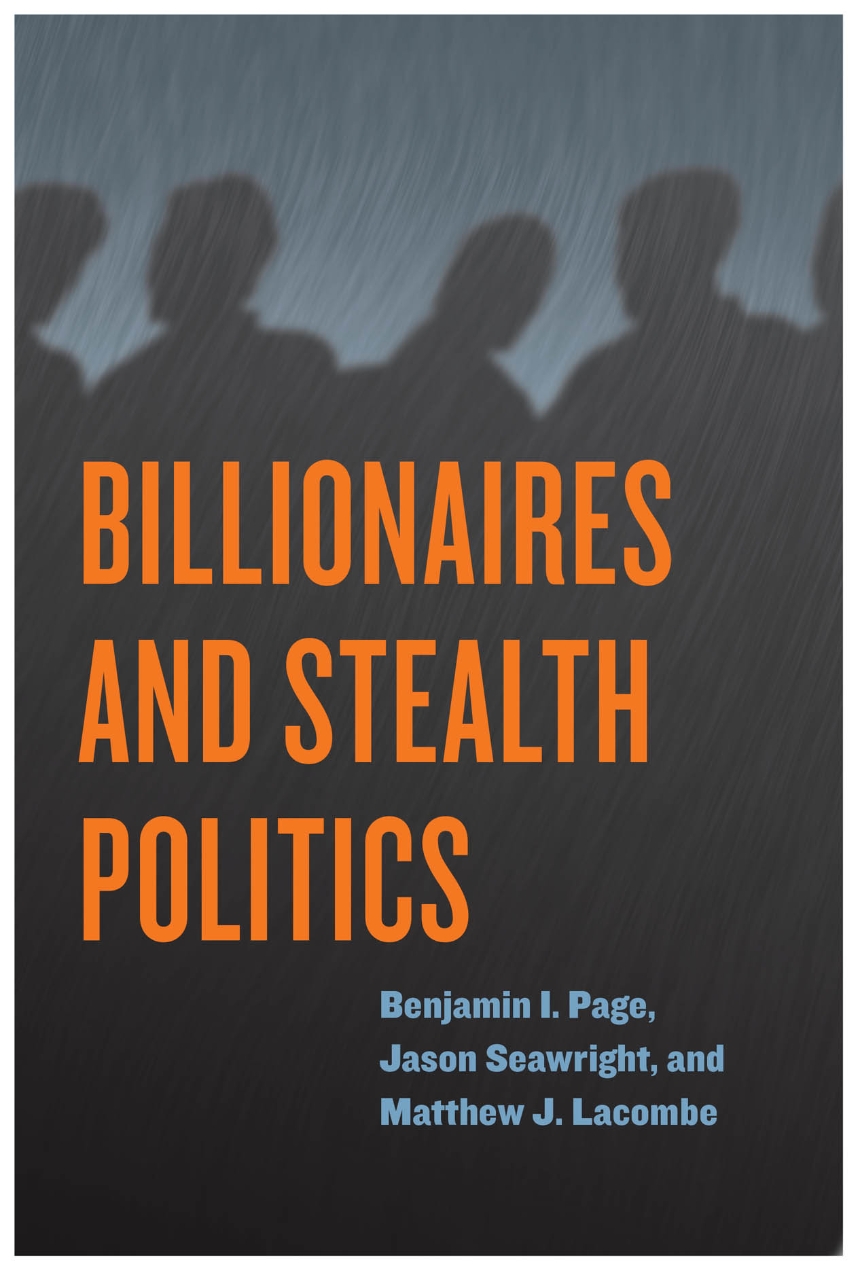Billionaires and Stealth Politics
In 2016, when millions of Americans voted for Donald Trump, many believed his claims that personal wealth would free him from wealthy donors and allow him to “drain the swamp.” But then Trump appointed several billionaires and multimillionaires to high-level positions and pursued billionaire-friendly policies, such as cutting corporate income taxes. Why the change from his fiery campaign rhetoric and promises to the working class? This should not be surprising, argue Benjamin I. Page, Jason Seawright, and Matthew J. Lacombe: As the gap between the wealthiest and the rest of us has widened, the few who hold one billion dollars or more in net worth have begun to play a more and more active part in politics—with serious consequences for democracy in the United States.
Page, Seawright, and Lacombe argue that while political contributions offer a window onto billionaires’ influence, especially on economic policy, they do not present a full picture of policy preferences and political actions. That is because on some of the most important issues, including taxation, immigration, and Social Security, billionaires have chosen to engage in “stealth politics.” They try hard to influence public policy, making large contributions to political parties and policy-focused causes, leading policy-advocacy organizations, holding political fundraisers, and bundling others’ contributions—all while rarely talking about public policy to the media. This means that their influence is not only unequal but also largely unaccountable to and unchallengeable by the American people. Stealth politics makes it difficult for ordinary citizens to know what billionaires are doing or mobilize against it. The book closes with remedies citizens can pursue if they wish to make wealthy Americans more politically accountable, such as public financing of political campaigns and easier voting procedures, and notes the broader types of reforms, such as a more progressive income tax system, that would be needed to increase political equality and reinvigorate majoritarian democracy in the United States.
Page, Seawright, and Lacombe argue that while political contributions offer a window onto billionaires’ influence, especially on economic policy, they do not present a full picture of policy preferences and political actions. That is because on some of the most important issues, including taxation, immigration, and Social Security, billionaires have chosen to engage in “stealth politics.” They try hard to influence public policy, making large contributions to political parties and policy-focused causes, leading policy-advocacy organizations, holding political fundraisers, and bundling others’ contributions—all while rarely talking about public policy to the media. This means that their influence is not only unequal but also largely unaccountable to and unchallengeable by the American people. Stealth politics makes it difficult for ordinary citizens to know what billionaires are doing or mobilize against it. The book closes with remedies citizens can pursue if they wish to make wealthy Americans more politically accountable, such as public financing of political campaigns and easier voting procedures, and notes the broader types of reforms, such as a more progressive income tax system, that would be needed to increase political equality and reinvigorate majoritarian democracy in the United States.
224 pages | 1 line drawing, 22 tables | 6 x 9 | © 2018
Political Science: American Government and Politics
Reviews
Table of Contents
Contents
List of Figures and Tables
Preface
Introduction
Chapter 1. Who the Billionaires Are
Chapter 2. Stealth Politics on Taxes and Social Security
Chapter 3. Four Billionaires Up Close
Chapter 4. Keeping Quiet on Social Issues
Chapter 5. Reshaping State and Local Politics
Chapter 6. What Is to Be Done about Billionaires?
Appendixes
1. Comparison between 2013 and 2016 Forbes Lists
2. Keywords Used for Taxation and Social Security Searches
3. Position Taking among Forbes Top 100 on Economic Issues
4. Position Taking among Forbes Top 100 on Social Issues
5. Keywords Used for Social Issue Searches
Notes
References
Index
List of Figures and Tables
Preface
Introduction
Chapter 1. Who the Billionaires Are
Chapter 2. Stealth Politics on Taxes and Social Security
Chapter 3. Four Billionaires Up Close
Chapter 4. Keeping Quiet on Social Issues
Chapter 5. Reshaping State and Local Politics
Chapter 6. What Is to Be Done about Billionaires?
Appendixes
1. Comparison between 2013 and 2016 Forbes Lists
2. Keywords Used for Taxation and Social Security Searches
3. Position Taking among Forbes Top 100 on Economic Issues
4. Position Taking among Forbes Top 100 on Social Issues
5. Keywords Used for Social Issue Searches
Notes
References
Index
